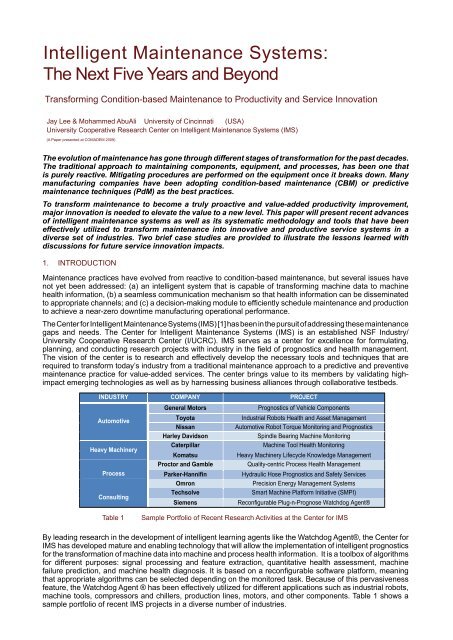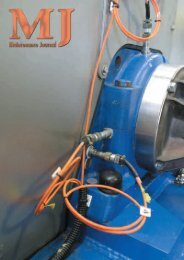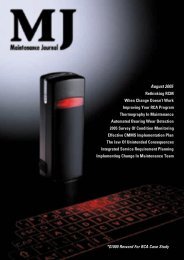SKF Reliability Systems - Library
SKF Reliability Systems - Library
SKF Reliability Systems - Library
You also want an ePaper? Increase the reach of your titles
YUMPU automatically turns print PDFs into web optimized ePapers that Google loves.
Intelligent Maintenance <strong>Systems</strong>:<br />
The Next Five Years and Beyond<br />
Transforming Condition-based Maintenance to Productivity and Service Innovation<br />
Jay Lee & Mohammed AbuAli University of Cincinnati (USA)<br />
University Cooperative Research Center on Intelligent Maintenance <strong>Systems</strong> (IMS)<br />
(A Paper presented at COMADEM 2009)<br />
The evolution of maintenance has gone through different stages of transformation for the past decades.<br />
The traditional approach to maintaining components, equipment, and processes, has been one that<br />
is purely reactive. Mitigating procedures are performed on the equipment once it breaks down. Many<br />
manufacturing companies have been adopting condition-based maintenance (CBM) or predictive<br />
maintenance techniques (PdM) as the best practices.<br />
To transform maintenance to become a truly proactive and value-added productivity improvement,<br />
major innovation is needed to elevate the value to a new level. This paper will present recent advances<br />
of intelligent maintenance systems as well as its systematic methodology and tools that have been<br />
effectively utilized to transform maintenance into innovative and productive service systems in a<br />
diverse set of industries. Two brief case studies are provided to illustrate the lessons learned with<br />
discussions for future service innovation impacts.<br />
1. INTRODUCTION<br />
Maintenance practices have evolved from reactive to condition-based maintenance, but several issues have<br />
not yet been addressed: (a) an intelligent system that is capable of transforming machine data to machine<br />
health information, (b) a seamless communication mechanism so that health information can be disseminated<br />
to appropriate channels; and (c) a decision-making module to efficiently schedule maintenance and production<br />
to achieve a near-zero downtime manufacturing operational performance.<br />
The Center for Intelligent Maintenance <strong>Systems</strong> (IMS) [1] has been in the pursuit of addressing these maintenance<br />
gaps and needs. The Center for Intelligent Maintenance <strong>Systems</strong> (IMS) is an established NSF Industry/<br />
University Cooperative Research Center (I/UCRC). IMS serves as a center for excellence for formulating,<br />
planning, and conducting research projects with industry in the field of prognostics and health management.<br />
The vision of the center is to research and effectively develop the necessary tools and techniques that are<br />
required to transform today’s industry from a traditional maintenance approach to a predictive and preventive<br />
maintenance practice for value-added services. The center brings value to its members by validating highimpact<br />
emerging technologies as well as by harnessing business alliances through collaborative testbeds.<br />
INDUSTRY COMPANY PROJECT<br />
General Motors Prognostics of Vehicle Components<br />
Automotive<br />
Toyota Industrial Robots Health and Asset Management<br />
Nissan Automotive Robot Torque Monitoring and Prognostics<br />
Harley Davidson Spindle Bearing Machine Monitoring<br />
Heavy Machinery<br />
Caterpillar<br />
Komatsu<br />
Machine Tool Health Monitoring<br />
Heavy Machinery Lifecycle Knowledge Management<br />
Proctor and Gamble Quality-centric Process Health Management<br />
Process<br />
Parker-Hannifin Hydraulic Hose Prognostics and Safety Services<br />
Omron Precision Energy Management <strong>Systems</strong><br />
Consulting<br />
Techsolve<br />
Siemens<br />
Smart Machine Platform Initiative (SMPI)<br />
Reconfigurable Plug-n-Prognose Watchdog Agent®<br />
Table 1 Sample Portfolio of Recent Research Activities at the Center for IMS<br />
By leading research in the development of intelligent learning agents like the Watchdog Agent®, the Center for<br />
IMS has developed mature and enabling technology that will allow the implementation of intelligent prognostics<br />
for the transformation of machine data into machine and process health information. It is a toolbox of algorithms<br />
for different purposes: signal processing and feature extraction, quantitative health assessment, machine<br />
failure prediction, and machine health diagnosis. It is based on a reconfigurable software platform, meaning<br />
that appropriate algorithms can be selected depending on the monitored task. Because of this pervasiveness<br />
feature, the Watchdog Agent ® has been effectively utilized for different applications such as industrial robots,<br />
machine tools, compressors and chillers, production lines, motors, and other components. Table 1 shows a<br />
sample portfolio of recent IMS projects in a diverse number of industries.

















